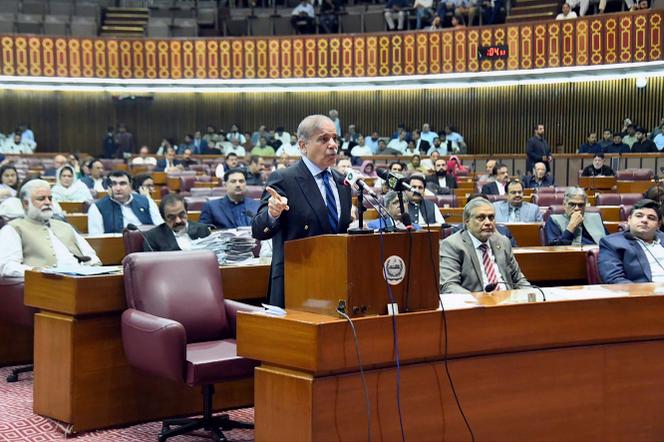


Pakistan’s president on Wednesday, August 9, dissolved the National Assembly, or lower house of parliament, a first step in the countdown to a general election by mid-November. The move came as the country's top opposition leader, Imran Khan, is fighting to overturn a corruption conviction that landed him in a high-security prison over the weekend.
A statement from the office of President Arif Alvi said he disbanded parliament on the advice of Prime Minister Shehbaz Sharif, who earlier in the day warned: "This country can't progress until we have national unity."
The new interim prime minister must be announced within three days of the parliament's dissolution, and elections held within 90 days – but the outgoing government has already warned they are likely to be delayed until next year.
The unlikely coalition between Pakistan's usually feuding dynastic parties – which came together to kick out Khan – has won little popular support while at the helm of the world's fifth-most populous country.
The economy is still in the doldrums despite a new International Monetary Fund bailout, with crippling foreign debt, soaring inflation and widespread unemployment from factories idled due to lack of foreign currency to buy raw materials.
"Economic decisions are invariably tough and often unpopular, requiring a government with a longer tenure to effectively implement them," said Ahmed Bilal Mehboob, president of the Pakistan Institute of Legislative Development and Transparency think tank.
"This election holds significance as it will result in a five-year term for a new government, which ideally should be empowered to make essential decisions vital for economic recovery."
There has been speculation for months that there could be a delay in elections as the establishment grapples to stabilize the country, which is facing overlapping security, economic and political crises.
Data from the latest census carried out in May was finally published at the weekend and the government says the election commission needs time to redraw constituency boundaries – a sore point for several political parties.
Michael Kugelman, director of the South Asia Institute at the Wilson Center, told AFP that any delay could give time to the main coalition partners, the Pakistan Muslim League-Nawaz (PML-N) and Pakistan Peoples Party (PPP), to figure out how to address the challenge of Khan's Pakistan Tehreek-e-Insaf (PTI) party. "But in reality, delaying the election could simply anger the public more and galvanize an opposition that has already suffered through months of crackdowns," he said.
Khan, who has been hit with more than 200 legal cases in recent months, has said the charges against him are politically motivated and designed to prevent him from contesting elections.
His first arrest and brief detention in May sparked days of sometimes violent protests, with unprecedented anger directed toward the military. It was met with a fierce crackdown that crushed his street power.
An interim government, expected to be made up largely of technocrats, will face a tough task. "Ultimately, the biggest challenge will be for the caretaker administration to stay above the partisan fray and not be dragged into the political battles being waged between the politicians and the military," Kugelman said. "It is after all a hyperpartisan and hyperpolarised moment – not an easy environment for an apolitical caretaker to navigate."
